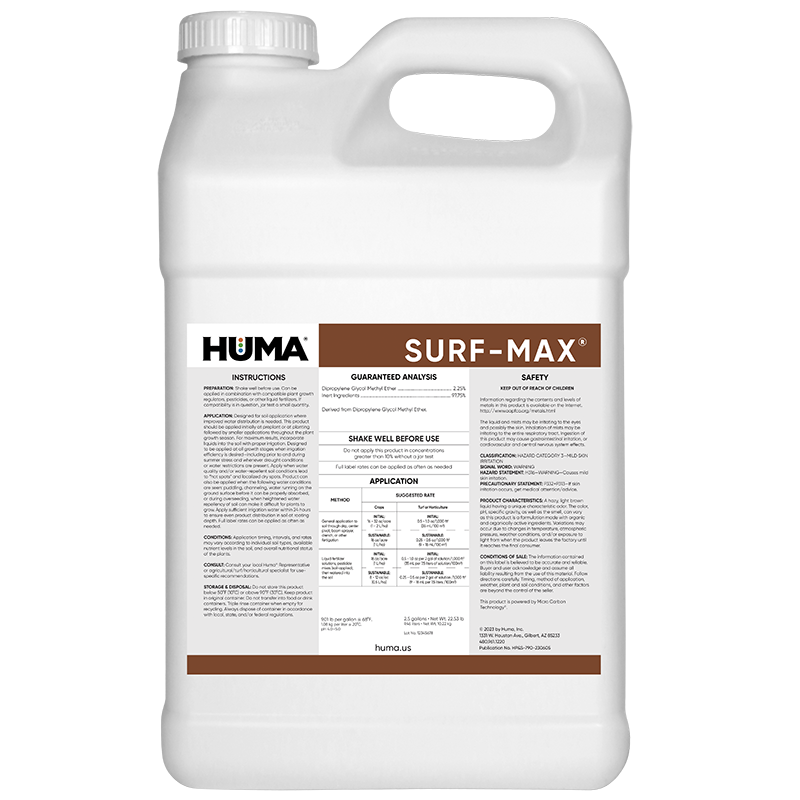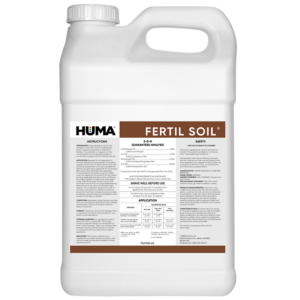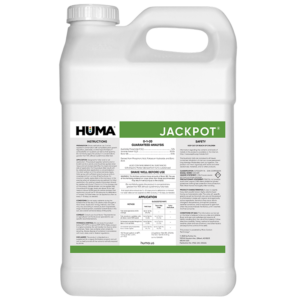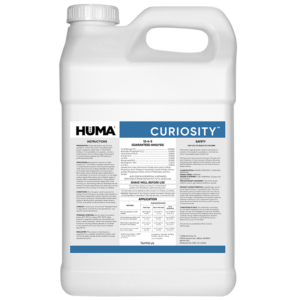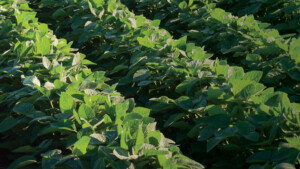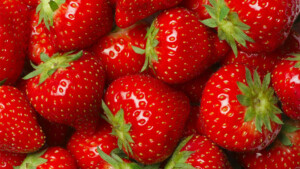SURF-MAX
Benefits of Use:
- Use up to 25% less irrigation water while attaining better water movement through the soil, more effectively providing moisture and delivering water-carried nutrients.
- Due to the complexed Micro Carbon Technology®, the benefits of carbon are carried directly through the soil to the root zone, enabling plants to more effectively absorb nutrients.
- Surf-Max® is fully biodegradable, non-hazardous, non-phytotoxic, and highly compatible with existing chemistries.
- Great for growers of strawberries, tomatoes, peppers, melons, cotton, potatoes fruit trees, olives, lettuce, carrots, blueberries, etc.
Deficiency Symptoms—When to Apply:
- Wherever drought conditions or water restrictions are present; when water conservation is important
- When planting in light-sandy, sandy-loam, or hydrophobic soils
FAQs
Related Videos
Soil Surfactant Surf-Max™ Demonstration A-3: Golf Course Hydration
Dr. Johann Buck demonstrates the effectiveness of SURF-MAX™, the Huma Gro® Turf soil surfactant on golf course turf.
Learn More
Soil Surfactant Surf-Max™ Demonstration A-2: Hydration Bench Test
Dr. Johann Buck demonstrates how SURF-MAX™, the Huma Gro® Turf soil surfactant can help water rapidly penetrate even compressed discs of coir (coconut) fiber.
Learn More
Soil Surfactant Surf-Max™ Demonstration A-1: Thatch Infiltration Bench Test
Dr. Johann Buck demonstrates how SURF-MAX™, the Huma Gro® Turf soil surfactant helps water penetrate hydrophobic turf thatch and spread evenly through the soil.
Learn More
Related Products
Related Case Studies
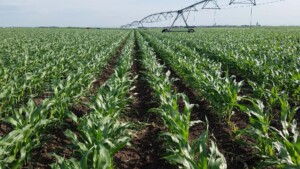
Huma® Organic Fertilizers Easy to Use, Improve Yield on Organic White Corn
Objective The objective of this field trial was for the grower to evaluate the ease of use and the effectiveness of 4 OMRI-Listed liquid Huma® organic crop nutrition products based on known field deficiencies. Materials & Methods The organic producer provided 2 80-acre plots of organic white corn in eastern Nebraska that was at the

Huma® Fertil Soil® Increases Corn Yield With 260% ROI
Background Application of Fertil Soil® to soils in combination with other Huma® fertilizers at various locations previously resulted in crops with improved plant growth and higher yields. Applying Fertil Soil® with grower standard products or as a single product application to soil and leaves could also impact results. Objective The focus of this study was

Effects of Huma® Products on N & P Stabilization in Sandy Soil
Objective To demonstrate the effects of Huma® products X-Tend®, Fertil Humus®, Fertil Soil®, and Zap® on the reduction of nitrogen and phosphorus leaching in Immokalee sandy soils. Background The leaching of nitrogen and phosphate fertilizers presents an ongoing problem in Florida soils. Agricultural amendments that reduce leaching when applied to soils or when mixed with
Related Blog Posts

From Doubt to Record Yields: My April Soybean Story
Dean’s response was predictable: ‘What in the **** are you thinking, Fred? You never plant beans until May!’ Five months later, that same field produced my highest-yielding soybeans ever. Turns out, planting early isn’t crazy—it might just be the smartest move I’ve made.

This Week in Ag #45
“Life.” That was my response when asked “What does soil health mean?” during an interview on The Big Show with WHO Radio last week. Whether it’s accelerating populations of soil microbes and worms, creating diverse biological communities or building biomass and aggregates, healthy soils are full of life. The trick is to stimulate and maintain biology in


